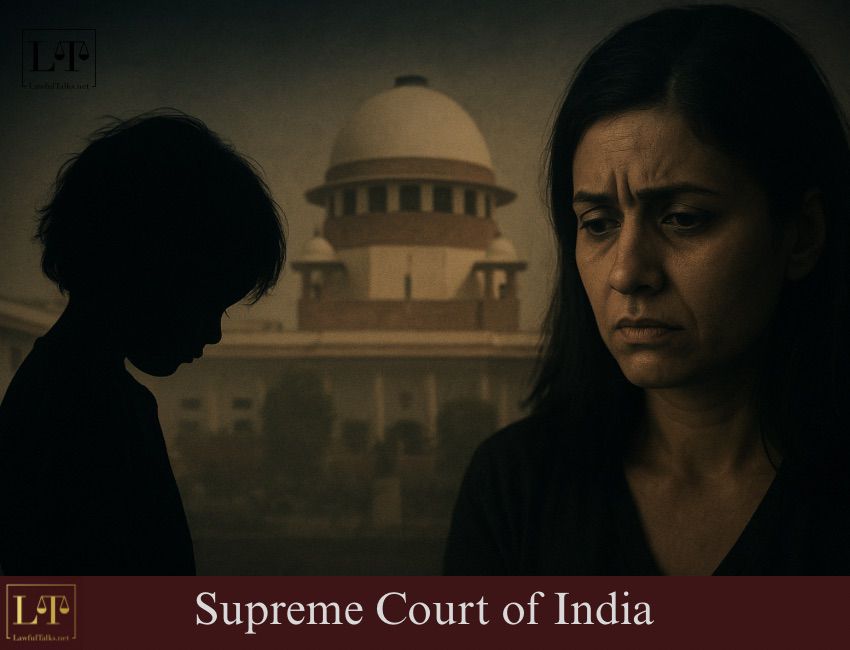Allahabad HC Sets Aside Afzal Ansari's Conviction, Allows Him to Continue as MP

In a case that brings the issue of gender neutrality under the Protection of Children from Sexual Offences (POCSO) Act into sharp focus, a Supreme Court Bench of Justice MM Sundresh and Justice Satish Chandra Sharma has issued notice on a plea filed by Archana Patil, a woman accused of sexually assaulting a minor boy.

The petition challenges the applicability of certain provisions of the POCSO Act, 2012, to female offenders. The counsel for Patil, argued that Sections 3(1)(a) to 3(1)(c) are inherently gender specific, employing pronouns such as “he” and “his”, which, according to him, exclude women from their purview. Recording these submissions, the bench directed, “Issue notice. In the meantime, further proceedings before the Trial Court shall remain stayed.”
Facts:
The petitioner has sought to contest the Karnataka High Court’s ruling of August 18, 2025, which dismissed her plea to quash criminal proceedings. The High Court had previously clarified that the POCSO Act protects all children regardless of gender and that women can be charged under its penal provisions, including Sections 4 and 6.
The controversy stems from a complaint filed by the parents of a 13-year-old boy who accused their 48-year-old neighbour, Patil, of repeatedly assaulting him during art lessons at her house between February and June 2020. Following an investigation, the police filed a charge sheet for offences punishable under Sections 4 and 6, and a case was registered before the Additional City Civil and Sessions Judge (Fast Track Special Court-I) in Bengaluru.
In her defense, Patil maintained before the High Court that the POCSO provisions invoked against her were worded in a manner applicable only to male perpetrators, and thus, their use against her was legally unsound. The High Court rejected this argument, emphasizing that the Act aims to protect all minors, regardless of gender.
“The Act, being a progressive enactment, is intended to safeguard the sanctity of childhood. It is rooted in gender neutrality with its beneficent object being the protection of all children, irrespective of sex. The Act is thus, gender neutral. Sections 3 and 5 which form the foundation for offences under Sections 4 and 6 of the Act, delineate various forms of assault. Although certain provisions may employ gendered pronouns, the preamble and purpose of the Act, render such usage inclusive. Therefore, it is inclusive of both male and female,” the High Court had observed.
The case again questions whether laws using gendered terms can still protect all children. For reference, Section 3 of the POCSO Act reads –
“3. Penetrative sexual assault.—A person is said to commit “penetrative sexual assault” if—
(a) he penetrates his penis, to any extent, into the vagina, mouth, urethra or anus of a child or makes the child to do so with him or any other person; or
(b) he inserts, to any extent, any object or a part of the body, not being the penis, into the vagina, the urethra or anus of the child or makes the child to do so with him or any other person; or
(c) he manipulates any part of the body of the child so as to cause penetration into the vagina, urethra, anus or any part of body of the child or makes the child to do so with him or any other person; or
(d) he applies his mouth to the penis, vagina, anus, urethra of the child or makes the child do so to such a person or any other person.”
Case Details: Archana Patil v. State of Karnataka & Anr.
(Petition for Special Leave to Appeal (Crl.) No. 15777/2025)

Anam Sayyed
4th Year, Law Student
Latest Posts
Categories
- International News 19 Posts
- Supreme Court 352 Posts
- High Courts 367 Posts





























































































































































































































































































































































































































































































































































































































































































































































